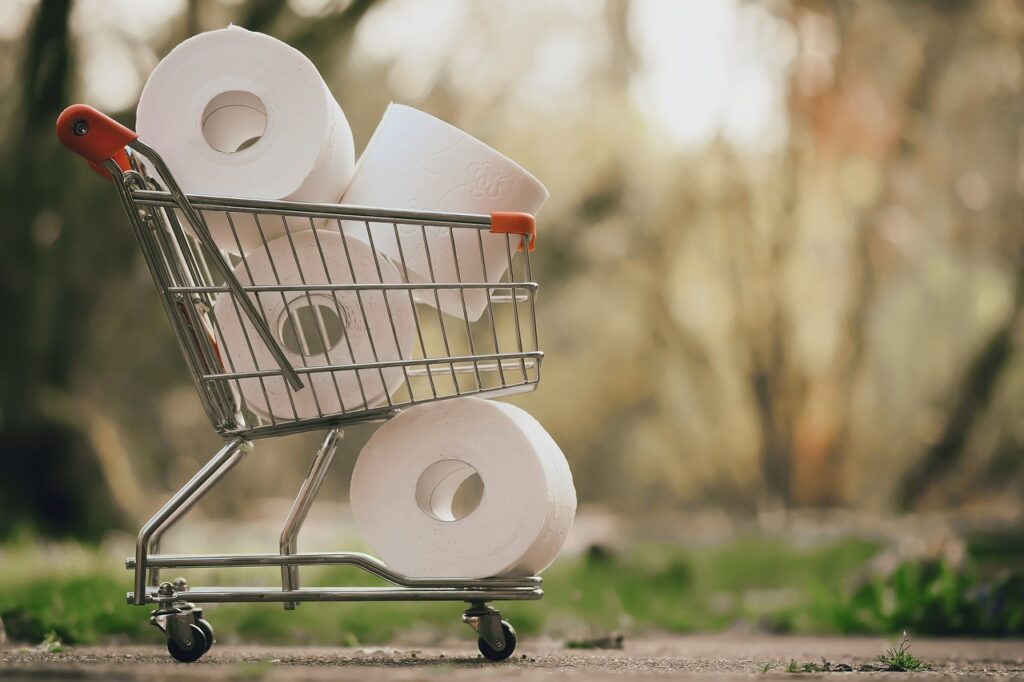The Downward Spiral of the TP Debate
Toilet paper – an everyday item that plays a pivotal role in our lives, yet is rarely given much thought beyond its practical use. However, as the world continues to grapple with environmental concerns, even the seemingly mundane can raise questions about its ecological impact, and given that the average American uses 130 rolls per year, its an important topic. In this article, we’ll dive deep into the topic of toilet paper and its biodegradability. We’ll explore how long it takes to decompose, its effects on the environment, and identify some of the best biodegradable options available.
1. Is Toilet Paper Biodegradable? The Unraveled Truth
Toilet paper is predominantly made from wood pulp, which is biodegradable in its natural state. However, many commercial toilet paper brands undergo processing, which can involve bleaching and the addition of chemicals. These processes can hinder the natural biodegradability of the paper. Additionally, there are some types of toilet paper that are marketed as ‘biodegradable toilet paper’ and I had thought this was just a marketing ploy, and justified making it more expensive. But, after some research, I found out this was not the case at all and ‘Biodegradable’ toilet paper can decompose up to 4 times faster than traditional toilet paper and is also safe for septic systems and comes from the following sources:
Sugar Cane Paper: Sugar cane paper is crafted from bagasse, a by-product of sugar production. This ingenious use of a waste material not only reduces waste but also eases the demand on sugar crops, ensuring they remain a sustainable resource. It’s a thoughtful way to repurpose what would otherwise be discarded in abundance.
Bamboo Paper: Bamboo is nature’s champion when it comes to rapid growth. Thriving in diverse conditions, bamboo is an up-and-coming star in the quest for sustainable, plastic-free living. What’s more, bamboo boasts natural antibacterial properties, eliminating the need for additional chemicals. With the growing popularity of eco-friendly alternatives, bamboo toilet paper has emerged as a sustainable, naturally antibacterial option for environmentally conscious consumers.
Hemp: Despite its versatility and sustainability, hemp sometimes carries an undeserved stigma due to its association with marijuana. However, hemp is an abundant resource in many US states and offers a viable solution to deforestation concerns. It’s an eco-friendly choice that presents an opportunity to conserve forests and protect the environment.
Kenaf: Kenaf is a remarkably fast-growing plant with the capacity to yield an astounding fifteen tons of paper-friendly materials per hectare. This exceptional growth rate allows for the production of a substantial amount of paper in a relatively small area. By incorporating Kenaf into the production of toilet paper, we can significantly reduce the ecological impact associated with traditional paper production.
2. How Long Does It Take Toilet Paper To Decompose?
The time it takes for toilet paper to decompose varies depending on several factors. In ideal conditions, plain, unbleached toilet paper may break down within a few weeks. However, in less favorable environments like landfills, where oxygen and microbes are scarce, it can persist for years.
3. What Effect Is Toilet Paper Having On Our Environment?
The mass production and consumption of toilet paper have a notable impact on the environment. Deforestation for the sourcing of wood pulp is a concern, and the use of bleach and chemicals in processing can contribute to water pollution. Additionally, the transportation of toilet paper products consumes energy and produces carbon emissions.
4. Which Is The Best Biodegradable Toilet Paper?
To make a more sustainable choice, many consumers are turning to biodegradable toilet paper options. In this section, we’ll explore some of the best choices on the market, including brands that use recycled materials, bamboo-based toilet paper, and those committed to minimal environmental impact. Noteworthy brands include:
1. Who Gives a Crap: This brand is renowned for its commitment to sustainability. They offer toilet paper made from bamboo or recycled paper, and they donate a significant portion of their profits to support sanitation projects worldwide.
2. Bim Bam Boo: Bim Bam Boo produces toilet paper from bamboo, which grows quickly and requires minimal resources. Their products are biodegradable and free from harsh chemicals, making them an excellent eco-conscious choice.
3. Tushy: Tushy is known for its bidet attachments, but they also offer bamboo toilet paper. By reducing your reliance on toilet paper and using a bidet, you can further minimize your environmental impact.
4. Silk’n Soft: Silk’n Soft offers toilet paper made from bamboo and sugarcane, both sustainable sources. They are committed to eco-friendly practices and provide a soft, biodegradable alternative.
5. Seventh Generation: This brand produces recycled toilet paper that’s whitened without chlorine bleach. By using post-consumer recycled materials, they contribute to reducing the environmental impact of paper production.
6. Cloud Paper: Cloud Paper is a notable choice, as they use fast-growing bamboo to produce toilet paper. Their commitment to sustainability includes carbon-neutral shipping, plastic-free packaging, and supporting reforestation efforts.
A Conscious Choice for a Greener Future
The question of toilet paper biodegradability brings to light the interconnectedness of our everyday choices and the environment. While conventional toilet paper may pose environmental concerns, there are more sustainable alternatives available. By opting for biodegradable toilet paper or considering other sanitation options, we can contribute to a greener and more eco-conscious future. After all, even the most ordinary items can hold the potential for change when we make thoughtful and informed decisions.



